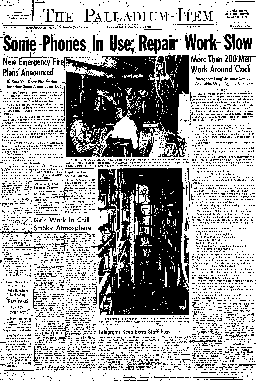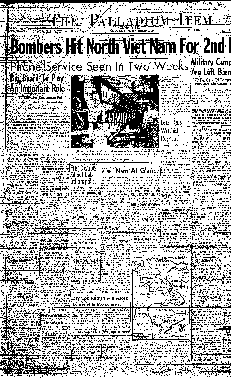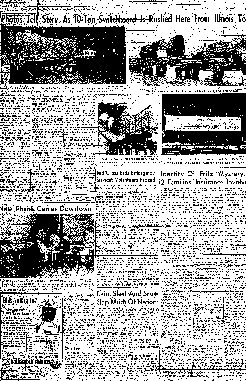Mayor Cordell said members of the council had volunteered earlier to help out in any way they could be of assistance but up to the present time the have not had to be called upon. However, since many of the volunteers who have been working will not be available now, we need their assistance.
Page 12 Fire Stories ...
Photos Tell Story As 10-Ton Switchboard Is Rushed Here From Illinois Town
[Photo]
The huge switchboard is shown as it is backed across the Masonic Lodge parking lot, toward the garage door of General Telephone Company. Concrete in parking spaces first had to be removed.
[Photo]
This photo shows the switchboard moving along the Tri-State tollway near Chicago.
[Photo]
Mayor Edward L. Cordell and Robert A. Rogosch, division manager of General Telephone, discuss plans for operation of the 28-operator switchboard.
[Photo]
This sign, on the side of the well-wrapped switchboard, made it clear to who saw the ponderous device go by where the unit was going and the nature of the mission.
By Jim Fleming
It was a big job but, like other big jobs in the past couple days, it was handled.
As a result, provision of more temporary service here drew closer late Sunday night with the arrival here of a 3,500 mile, 28-operator switchboard from Antioch, Ill.
An 80-foot house moving rig arrived here at 10:30 p.m., completing the 310-mile trip in 15 hours.
A large crowd began to assemble about 10 p.m. Sunday, near North Ninth and A Streets, when word was spread the Illinois Bell Co, switchboard was nearing the city. A light rain which fell all night failed to keep interested spectators away.
Palladium-Item newsmen were kept in contact with progress of the switchboard's movement through amateur radio operator relays from Fowler Macy of Converse, Ind., and Donald D. Dodson, of Antioch. A message from a police squad car told newsmen, too, when the equipment reached Cambridge City.
At 10:25 a murmur went through the crowd as the huge rig transporting the unit was spotted, moving ponderously South on North Ninth Street. One-way street designations were forgotten as an escort of three state and local police cars led the enormous equipment toward its destination.
The truck swung east onto North A Street. Immediately apparent were two signs, fastened on each side of the switchboard, reading:
"Emergency switchboard for fire stricken Richmond, Ind., from Illinois Bell Telephone Co."
A spokesman for the company which handled the unprecedented hauling job, J.C. Muehdelt & Sons, Wheaton, Ill., said the rig had pulled out of Antioch at 7:30 a.m. EST. At an average speed of 22 miles per hour, escorted by police all the way, it moved south on the Tri-State Tollway, into Indiana.
The truck was given right-of-way over all traffic as it lumbered along. By 7 p.m. it was reported coming around Indianapolis, as state police running an escort kept local officials notified by radio.
Crowds remained at the scene as the switchboard was pulled into Masonic Hall parking lot at the rear of the phone company. Slowly, almost inperceptibly at times, crews prepared the unit to be pushed into the company's garage.
Inside By 2:30 A.M.
By 2:30 a.m. Monday, the switchboard was completely inside the garage. Several hours later, men removed it from the frame which had comprised the "trailer" on which it had rolled, two 60-foot timbers nearly 18 inches square and dozens of smaller, cross-braces.
Most persons on hand for the arrival of the equipment, although informed of its size, were visibly impressed when they saw how big it was. Thousands of wires crisscross the back, and hundreds of plugs stand ready on the front for the day when it is put into service.
Glen Lauher, traffic engineer for General, but an employee of Illinois Bell Co. who helped take the board out of service when Antioch converted to dial phones in 1961, is one of many who will help hook the board here.
He explained that the unit at one time consisted of relatively few operator "stations," when it was first built 40 years ago. From time to time, especially after World War II, new stations were added.
The newest were put in only five years ago, just eight months before the board was taken out of service in favor of automatic equipment.
He said the board not only served Antioch, a community of 2,300, but also several neighboring towns and resort areas. Signs at each station still carry names of norther Illinois towns.
Lauher added that the board because so huge because of the vast numbers of people who moved to the area immediately after the war.
New Phone Center Downtown
[Photo]
Telephone workers put the finishing touches on a new emergency long distance phone center, located at 712 East Main Street, as several take advantage of available phones. The center was transferred from the phone firm's business office on North Ninth street to give phone repair crews more room.
Red Cross Ends Emergency Service; Volunteers Praised
Late Sunday night the Wayne County chapter of the American Red Cross here concluded four days and three nights of around-the-clock aid during the telephone company emergency.
Although an emergency still exists as far as the phone company and phone service is concerned the crisis created by the fire itself is considered over.
"It would be difficult to estimate the number of volunteers participating," says Mrs. Thelma Koon, executive director of the local Red Cross chapter.
Many Offered Aid
"In addition to those volunteers assigned to specific duties others kept appearing, on the scene asking what they could do and where the Red Cross could use them," she related. "Offers of assistance also came form Indianapolis area and Fayette County Red Cross Chapters."
Beginning early Thursday morning volunteers served coffee and doughnuts to firemen followed by a warm lunch at noon. Also served at noon were the amateur operators at the chapter house and at the Richmond city building. Plans were then made to supply sandwiches and coffee to the four six-hour shifts of workers at the city building.
Thursday evening the need for canteen service at the General Telephone company garage became apparent. Large numbers of telephone workers who had been called into Richmond as well as the local workers were not taking time off to eat regular meals.
This canteen service was continued on a 24-hour basis and at 6 p.m. Friday the Food Committee of the chapter's regular disaster preparedness set-up took over the responsibility for delivering food to the telephone company garage.
Harold C. Cope of Earlham college, as chairman of this committee, was then in charge of the operation and the food was prepared and brought form the college.
Clem Zwissler is disaster chairman of the local chapter and Mrs. Ross Harrington is chairman in charge of all volunteers. Jack Bryan of Hagerstown is the chapter's canteen chairman for all of Wayne county.
There are four patterns of Red Cross organization for disaster preparedness, tells the executive director.
"Our Chapter has been classified under Pattern "B," which is for chapters that historically has not been confronted with major disasters.
"Last week we were confronted with a disaster during which time there was much evidence of our being a voluntary organization through which all people may serve in the American tradition of neighbor helping neighbor.
Transcribed by James E. Bellaire - Copyright 1965 Palladium-Item






